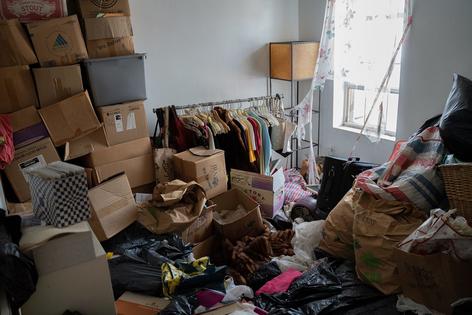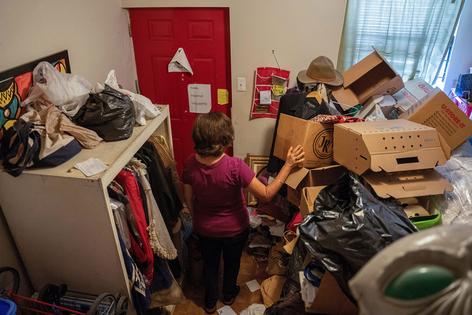How to help a hoarder set goals and make progress
Published in Senior Living Features
Experts on hoarding have a saying about people who are overwhelmed by their stuff: This problem didn't happen overnight and it won't be fixed overnight either.
Hoarding is not just one problem. Some people save things they think could be useful in the future. Others have hypersentimental relationships with objects or even think of them as having feelings. Some are afraid to waste anything and want good homes for their discarded possessions. Depression, anxiety and attention deficit disorder are common. Acquiring new things feels good; managing them can be a problem. Many older hoarders struggle with organizing.
Untangling this mess is not as simple as calling the local junk company and telling them to lug all your father's stuff away. Virtually everyone who's been the target of a forced clean-out hoards again, often at higher levels.
Nor will watching a few episodes of "tidying" guru Marie Kondo talking about only keeping objects that "spark joy" do the trick. Everything brings some hoarders joy. But Thea Gallagher, a psychologist at the Center for the Treatment and Study of Anxiety at the University of Pennsylvania, does like Kondo's idea of thanking belongings for their service when it's time to let them go.
Common family reactions like arguing and shaming just push hoarders away. It's also counter-productive to store hoarders' stuff, pay for storage units or let them skip their turn to host Thanksgiving dinner.
What does help, experts said, is having goals that focus on the person who hoards, not our own reaction to the mess. "How can we make you safe?" is the right question. Start out thinking about safe walkways, a safe place to cook, a usable bathroom and clear stairs.
For serious hoarding behavior, professional intervention can reduce family exasperation - and the clutter. The pros keep goals small and expect slow progress. "Patience is key, like nearly boundless amounts of patience, like toddler-raising patience," said Dara Leinweber, a case manager in a hoarding program operated by Jewish Family and Children's Services of Greater Philadelphia.
Successful hoarding treatments, experts said, hinge on some key factors: motivating change, re-framing dysfunctional thoughts about belongings, helping people learn to tolerate negative emotions associated with discarding things or not buying more and helping people learn organizing skills. The work takes many sessions (often 20 or more) and is most successful when counselors work with hoarders in their homes.
"The first step is admitting your situation is no longer manageable and you want to make a change," Leinweber said.
Patients need to find their own motivation. One person might want to avoid eviction. Another wants grandkids or friends to visit. Another wants to cook again or sleep in her bed. Leinweber said many of her older clients want to make decisions about their possessions while they still can.
Jed Siev, a psychologist who has studied hoarding and teaches at Swarthmore College, said family members often want him to force a relative to clean up. "That's like saying, 'I really want my mom to run a marathon, but she hates running,' " he said.
People who hoard need to be involved in cleaning the mess, even if that makes the work excruciatingly slow. The point of in-home sessions is to help people with hoarding disorder learn that they can cope with letting possessions go. "I don't make a single decision," said Alison Lush, a certified professional organizer who is president of the Institute for Challenging Disorganization. "I help the client figure out why it is they're stuck."
Therapists may ask a lot of questions. How long has it been since you've used that? Do you think anyone else would want it? How many of those do you have? How much space do you have? What do think will happen if you give that away?
Catherine Ayers, a rare researcher who focuses on older people who hoard, found that they are more likely to suffer from a particular deficit: problems with executive function - decision-making - that impair their ability to organize. She found that older hoarders couldn't benefit from cognitive behavioral therapy, which targets disordered thinking patterns, until they developed better thinking skills. Her treatment program, known as Cognitive Rehabilitation and Exposure/Sorting Therapy (CREST) starts with teaching basic organizational skills that many of us take for granted, like using a calendar, dividing a big job into small parts or setting aside specific time each day for a task. Ayers, a psychologist who is section chief outpatient mental health clinics La Jolla at the VA San Diego Healthcare System, helps patients develop new habits, like sorting while watching Jeopardy. Her program is less focused on challenging beliefs than some treatments. In a randomized controlled trial, CREST reduced clutter by about 38 percent.
Lush said it's easier for her to help people whose biggest problem is disorganization than those who seem tied to their possessions by a "very powerful and mysterious psychic glue."
Organizers and therapists may have to start with a one-foot square per day. Once done, they may mark it with masking tape and make it off limits for new clutter.
Groups like Clutterers Anonymous or Buried in Treasures may also help. A member of a Clutterers Anonymous group in Center City calls a buddy before she starts working and says how long she'll be working. When the time's up, she calls back to report - honestly - how much she accomplished.
If you're a serious hoarder, the easiest, and most important, goal is to keep your house safe. That means you won't trip on your stuff, increase the likelihood of a fire or expose yourself to dangerous bacteria and insects. Firefighters, police and paramedics will be able to enter your house or apartment safely.
The Philadelphia Hoarding Task Force's new guidelines suggest you start here:
- Clear 3-foot-wide pathways through the house and on the stairs.
- Keep piles to no more than four feet high.
- Make sure all doors can be opened freely.
- Keep stuff off the stove.
- Clear a one-foot space around heating equipment, hot water heaters and electrical panels.
- Regularly remove rotting food and garbage.
- Keep clutter away from outlets, surge protectors and extension cords.
Visit The Philadelphia Inquirer at www.inquirer.com












Comments